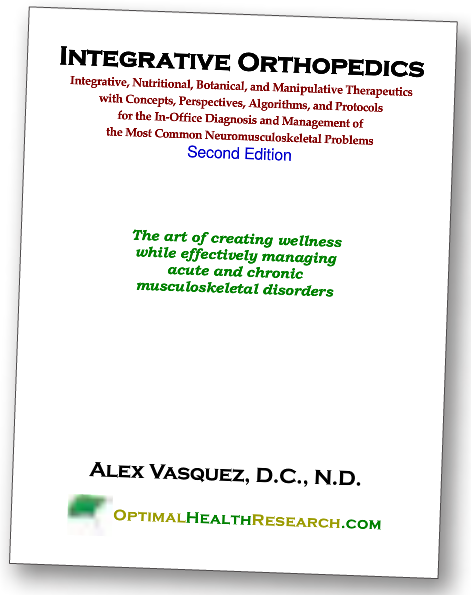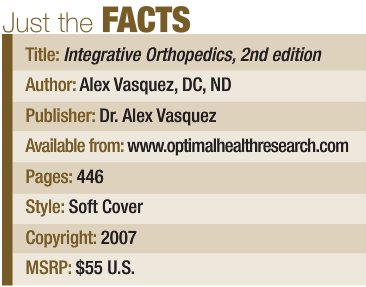 Integrative Orthopedics
Integrative Orthopedics
2nd edition
Integrative Orthopedics is the antecedent textbook that complements and accompanies Dr. Vasquez’s Integrative Rheumatology text. Integrative Orthopedics presents and assesses concepts of the evaluation and management of both acute and chronic musculoskeletal disorders and injuries.
The book was written on the basis of providing licensed, qualified, healthcare practitioners with a medical text that pulls together the medical school courses of physical examination, manipulation, physiotherapy, nutrition, botanical medicine, neurology and therapeutic exercise. This is an extrapolation and compilation of concepts that support the attainment of skills that enable a clinician to assist patients in surmounting their musculoskeletal problems while simultaneously promoting patient wellness. The foundation of the book sustains the big picture of health as opposed to focusing on the “problem”, or in this case, the musculoskeletal pain or dysfunction.
The book is composed of 16 chapters with 11 of the chapters focusing on a specific area of the body, ie, pelvis and sacroiliac joint, shoulder, low back. The third chapter of the book collects a chapter on comprehensive musculoskeletal care, “Whether dealing with a recent and acutely painful injury or an exacerbation of a chronic injury or musculoskeletal disease, all integrative clinicians are wise to have at their disposal a comprehensive protocol for the management of acute & subacute pain and exacerbations of joint inflammation” (pg. 120). Similar to Integrative Rheumatology, Dr. Vasquez embeds peer-review and quality-control measures to ensure accuracy and clinical applicability of the information in the book. This is accomplished via four measures; these being reliance on authoritative references (Merck Manual), extensive cross referencing, periodic revision and peer review.
 Health and disease are conditions of the whole person, a whole involving the complex interaction of multiple factors. By seeking the “big” picture of what is underlying a patient’s musculoskeletal complaint, a clinician avoids the deleterious effects of focusing solely on the problem. Both of Dr. Vasquez’s books support the naturopathic principle of Tolle Totem, by taking their multiple factors into account, may a physician truly be treating the whole person.
Health and disease are conditions of the whole person, a whole involving the complex interaction of multiple factors. By seeking the “big” picture of what is underlying a patient’s musculoskeletal complaint, a clinician avoids the deleterious effects of focusing solely on the problem. Both of Dr. Vasquez’s books support the naturopathic principle of Tolle Totem, by taking their multiple factors into account, may a physician truly be treating the whole person.
 Stacie Deyglio, ND received her baccalaureate degree in biology with a minor in chemistry from the College of Mt. St. Vincent in New York. Her personal health issues paved the way to discovering naturopathic medicine in 1999. Resonating with the philosophy and principles of naturopathic medicine, Dr. Deyglio graduated from the University of Bridgeport, College of Naturopathic Medicine in 2003. As a medical student, she was involved in student government, fundraising and the generation of two successful student run health fairs. Dr. Deyglio’s interests include relating integrative therapeutics to the health of pediatric and geriatric populations. Currently residing in Phoenix, Dr. Deyglio is an avid bookworm, and is actively creating her practic
Stacie Deyglio, ND received her baccalaureate degree in biology with a minor in chemistry from the College of Mt. St. Vincent in New York. Her personal health issues paved the way to discovering naturopathic medicine in 1999. Resonating with the philosophy and principles of naturopathic medicine, Dr. Deyglio graduated from the University of Bridgeport, College of Naturopathic Medicine in 2003. As a medical student, she was involved in student government, fundraising and the generation of two successful student run health fairs. Dr. Deyglio’s interests include relating integrative therapeutics to the health of pediatric and geriatric populations. Currently residing in Phoenix, Dr. Deyglio is an avid bookworm, and is actively creating her practic

